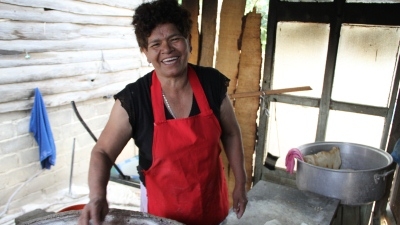Thirty-nine-year-old Isis Bautista sells clothing in a Mexico City tianguis (informal market) and cleans houses for a living. She is a single mother of three. Previously, she barely had enough money to buy two bread rolls on some days. “With my jobs, there are days when I have no cash,” she says.
But if her two younger children need something for school, she can now buy it thanks to a stipend she receives from the Prospera Program. Her oldest child, aged 21, works as a mechanic. For Isis, the main thing is to see her children happy: “I want them to do whatever they want to do,” she says.
In addition, she receives economic support to help cover food or home energy costs. “It is a way to have extras. If you’re going to eat beans, you can have beans with eggs. If you’re going to eat eggs, then eggs with ham, and so on,” she says with a smile.
This cash payment encourages her to send her children to school and the whole family for regular medical checkups. “I used to get a checkup every now and then; I would go to the doctor when I felt bad. Now I know that I have to visit the doctor for a yearly checkup. Now I know what my glucose level is and I write it down every time I go.”
She is clear that the support does not mean not making an effort: “This program doesn’t resolve your life, rather, it teaches you to resolve certain things based on this program.”
More time in school
Isis and her children are part of the 5.8 million Mexican families that have benefited from Prospera, a conditional cash transfer program formerly known as Oportunidades.
The idea was simple enough: give money to a mother to encourage her to send her children to school and to the health center for regular checkups. That simple idea, which began in the 1990s, has now become a nationwide program in Mexico, benefitting a fourth of the country’s total population.
Studies have demonstrated several program achievements. For example, as compared with non-beneficiaries, male program participants have an average of 10 additional months of schooling, whereas the average for female beneficiaries is eight additional months.
Twenty-five-year old Jonatán Gallegos, for example, was a Prospera beneficiary during his last year in secondary school and in prep school. He later studied sociology and is now an employee of the Prospera program. His father is a waiter and his mother a homemaker. He also has an older sister (who studied economics) and two younger brothers.
Without the program, “it would have been much more difficult to go to college,” he says. With only his father’s salary, it would have been hard to cover expenses for books or photocopies, he explains.
“It means getting ahead a little, not only me but as a family,” says Jonatán. He mentions how proud his parents are about having two children with university degrees – his mother only completed primary school whereas his father finished secondary school.
Employment and credit
The program has expanded its scope: it now includes vocational training for young people and promotes their employment through the National Employment Service. Additionally, the program promotes financial inclusion by increasing beneficiaries’ access to savings, microcredit and insurance.
“The program has maintained its basic components, which have demonstrated results over time: nutrition, health and education,” says Francesca Lamanna, social protection specialist at the World Bank, which has contributed some US$ 2.75 billion to finance the program. “Additionally, -- and this is the most innovative part -- the program has expanded activities to favor the social and productive inclusion of beneficiaries,” she says.
So that people like Isis can start or expand a business, for example, in an ongoing effort to improve their lives.

